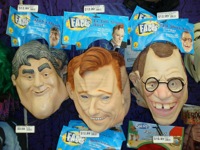Difference between revisions of "Self-deprecation"
m (Text replacement - "http://" to "https://") |
|||
| Line 3: | Line 3: | ||
==Origin== | ==Origin== | ||
[[Latin]] ''deprecatus'', past participle of ''deprecari'' to avert by [[prayer]], from ''de''- + ''precari'' to pray | [[Latin]] ''deprecatus'', past participle of ''deprecari'' to avert by [[prayer]], from ''de''- + ''precari'' to pray | ||
| − | *[ | + | *[https://en.wikipedia.org/wiki/17th_century 1628] |
==Definitions== | ==Definitions== | ||
*1a archaic : to [[pray]] against (as an [[evil]]) | *1a archaic : to [[pray]] against (as an [[evil]]) | ||
| Line 11: | Line 11: | ||
:b : belittle, disparage <the most [[reluctantly]] admired and least easily deprecated of … novelists — New Yorker> | :b : belittle, disparage <the most [[reluctantly]] admired and least easily deprecated of … novelists — New Yorker> | ||
==Description== | ==Description== | ||
| − | '''Self-deprecating''' [[humor]] relies on the [[observation]] of something supposedly [[negative]] about the person delivering the [[commentary]]. Many comedians use ''self-deprecating'' [[humor]] to avoid seeming arrogant or pompous, and to help the [[audience]] identify with them. In this way, the use of ''self-deprecating'' humor could be seen as an [[application]] of the [[rhetorical]] concept of [[ethos]]. This is seen as a major component of the comedy of comedians such as [ | + | '''Self-deprecating''' [[humor]] relies on the [[observation]] of something supposedly [[negative]] about the person delivering the [[commentary]]. Many comedians use ''self-deprecating'' [[humor]] to avoid seeming arrogant or pompous, and to help the [[audience]] identify with them. In this way, the use of ''self-deprecating'' humor could be seen as an [[application]] of the [[rhetorical]] concept of [[ethos]]. This is seen as a major component of the comedy of comedians such as [https://en.wikipedia.org/wiki/Joan_Rivers Joan Rivers], [https://en.wikipedia.org/wiki/Louis_C.K. Louis C.K.], [https://en.wikipedia.org/wiki/Don_Knotts Don Knotts], and [https://en.wikipedia.org/wiki/Woody_Allen Woody Allen]. |
The [[technique]] is often used to [[balance]] the [[audience]] [[judgment]] on a performer, after exhibiting conspicuous displays of [[arrogance]]. | The [[technique]] is often used to [[balance]] the [[audience]] [[judgment]] on a performer, after exhibiting conspicuous displays of [[arrogance]]. | ||
Latest revision as of 02:32, 13 December 2020
Origin
Latin deprecatus, past participle of deprecari to avert by prayer, from de- + precari to pray
Definitions
- 2: to express disapproval of
- 3a : play down : make little of <speaks five languages … but deprecates this facility — Time>
- b : belittle, disparage <the most reluctantly admired and least easily deprecated of … novelists — New Yorker>
Description
Self-deprecating humor relies on the observation of something supposedly negative about the person delivering the commentary. Many comedians use self-deprecating humor to avoid seeming arrogant or pompous, and to help the audience identify with them. In this way, the use of self-deprecating humor could be seen as an application of the rhetorical concept of ethos. This is seen as a major component of the comedy of comedians such as Joan Rivers, Louis C.K., Don Knotts, and Woody Allen.
The technique is often used to balance the audience judgment on a performer, after exhibiting conspicuous displays of arrogance.
Professionals in any given field will also either avoid typical jargon and use lay terms to be understood and therefore appreciated by the masses.
Self-deprecation is an important aspect to clowns. Unlike other forms of comedy, an audience is typically supposed to laugh at the plight of the clown, not with it.
